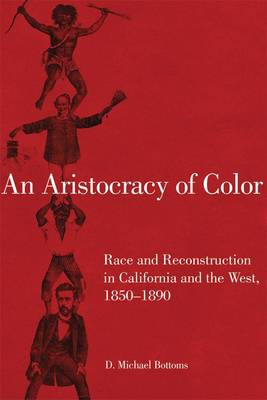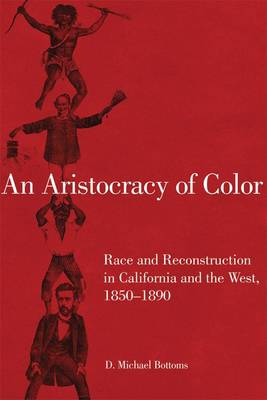
- Retrait gratuit dans votre magasin Club
- 7.000.000 titres dans notre catalogue
- Payer en toute sécurité
- Toujours un magasin près de chez vous
- Retrait gratuit dans votre magasin Club
- 7.000.0000 titres dans notre catalogue
- Payer en toute sécurité
- Toujours un magasin près de chez vous
An Aristocracy of Color
Race and Reconstruction in California and the West, 1850-1890 Volume 5
D Michael BottomsDescription
In the South after the Civil War, the reassertion of white supremacy tended to pit white against black. In the West, by contrast, a radically different drama emerged, particularly in multiracial, multiethnic California. State elections in California to ratify Reconstruction-era amendments to the U.S. Constitution raised the question of whether extending suffrage to black Californians might also lead to the political participation of thousands of Chinese immigrants.
As historian D. Michael Bottoms shows in An Aristocracy of Color, many white Californians saw in this and other Reconstruction legislation a threat to the fragile racial hierarchy they had imposed on the state's legal system during the 1850s. But nonwhite Californians--blacks and Chinese in particular--recognized an unprecedented opportunity to reshape the state's race relations. Drawing on court records, political debates, and eyewitness accounts, Bottoms brings to life the monumental battle that followed.
Bottoms begins by analyzing white Californians' mid-century efforts to prohibit nonwhite testimony against whites in court. Challenges to these laws by blacks and Chinese during Reconstruction followed a trajectory that would be repeated in later contests. Each minority challenged the others for higher status in court, at the polls, in education, and elsewhere, employing stereotypes and ideas of racial difference popular among whites to argue for its own rightful place in "civilized" society. Whites contributed to the melee by occasionally yielding to blacks in order to keep the Chinese and California Indians at a disadvantage.These dynamics reverberated in other state legal systems throughout the West in the mid- to late 1800s and nationwide in the twentieth century. As An Aristocracy of Color reveals, Reconstruction outside of the South briefly promised an opportunity for broader equality but in the end strengthened and preserved the racial hierarchy that favored whites.
Spécifications
Parties prenantes
- Auteur(s) :
- Editeur:
Contenu
- Nombre de pages :
- 292
- Langue:
- Anglais
- Collection :
- Tome:
- n° 5
Caractéristiques
- EAN:
- 9780806146492
- Date de parution :
- 15-09-14
- Format:
- Livre broché
- Format numérique:
- Trade paperback (VS)
- Dimensions :
- 150 mm x 226 mm
- Poids :
- 408 g

Les avis
Nous publions uniquement les avis qui respectent les conditions requises. Consultez nos conditions pour les avis.






